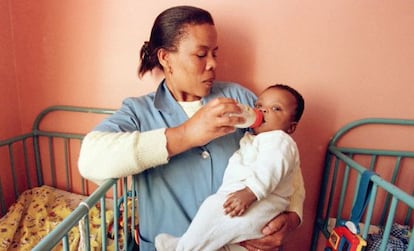Cuba becomes first nation to eliminate mother-to-child HIV transmission
World Health Organization also validates eradication of mom-to-baby spread of syphilis


Every year, about 1.4 million women with HIV get pregnant. If they do not receive treatment, there is a 15- to 45-percent chance of them transmitting the virus to their babies during pregnancy, birth, or while breastfeeding.
After several decades of research failed to yield an effective cure, breaking the vicious cycle that perpetuates the virus presents a tremendous challenge. But that is exactly what Cuba has done. On Tuesday, the World Health Organization (WHO) officially recognized the Caribbean nation’s achievement.
Canada, the US and Puerto Rico are also believed to have eliminated mother-to-baby HIV transmission
During a ceremony at the Washington office of the Pan American Health Organization (PAHO, WHO’s regional branch in the Americas), the organization certified Cuba as the first country in the world to meet the double challenge of eliminating mother-to-child transmission of HIV and syphilis.
“This is a major victory in our fight against HIV” and “an important step towards having an AIDS-free generation,” said PAHO Director Dr Carissa F. Etienne.
“Eliminating transmission of a virus is one of the greatest public health achievements possible,” said WHO Director-General Dr Margaret Chan in a statement.
The likelihood of a mother passing on the HIV virus to her baby falls from 15 to 45 percent to just one percent if both receive antiretroviral drugs during all phases in which there is a risk of transmission. According to the WHO, the number of children born with the virus has decreased by half in the last few years, from 400,000 in 2009 to 240,000 in 2013.
But that number is still very far from the stated goal for this year: 40,000.
Cuba’s success demonstrates that universal access to healthcare is feasible” PAHO Director Dr Carissa F. Etienne
The fight against mother-to-child transmission of syphilis still presents several challenges. Every year, almost one million pregnant women are infected with a disease that can cause early fetal loss and stillbirth, neonatal death, low-birth-weight infants, and serious neonatal infections. However, “simple, cost-effective screening and treatment options during pregnancy, such as penicillin, can eliminate most of these complications,” the WHO said in a statement.
During the ceremony with Cuban Health Minister Roberto Morales Ojeda, PAHO Director Etienne highlighted the key to the Cuban achievement: universal and affordable healthcare coverage.
“Cuba’s success demonstrates that universal access and universal health coverage are feasible and indeed are the key to success, even against challenges as daunting as HIV,” Etienne said. UNAIDS Deputy Executive Director Luiz Loures and UNICEF Chief of Health Mickey Chopra agreed.
Cuba offers a public health service that is “free, accessible in every region, comprehensive and without discrimination, based on primary care,” said the Cuban minister. He also attributed the country’s success to “political will” and the participation of communities in preventive and primary care programs.
But universal and affordable healthcare coverage goes beyond the fight against AIDS, added PAHO Director Etienne.
Last year’s ebola epidemic “has shown us that if you have a strong health system focused on primary care and universal access and coverage, you can face any challenge, whether it is a natural disaster or infectious diseases,” Etienne said.
The WHO and the PAHO have been working on a regional initiative to eliminate mother-to-child transmission of HIV and syphilis since 2010
Although Cuba is the first country to receive this certification, six other countries and territories may be eligible because they may also have managed to eliminate mother-to-baby transmission of HIV and syphilis: the British islands of Anguilla and Montserrat, Barbados, Canada, the United States and Puerto Rico.
WHO considers that a country has succeeded in eradicating mother-to-child transmission of HIV when there are fewer than two HIV-positive babies born per 100 births to mothers who carry the virus. In the case of syphilis, the organization calls for less than one case per 2,000 live births.
With the help of the PAHO initiative, Cuba has implemented early prenatal measures and HIV and syphilis tests for pregnant women and prospective fathers in recent years. The government also provides treatment to women who test positive and promotes prevention methods such as the use of condoms.
As a result, Cuba only reported two cases of babies born with HIV and five born with syphilis in 2014. These numbers surpassed WHO requirements for certification.
Although WHO’s main objective is to encourage countries to continue their efforts to eliminate vertical transmission of the disease, experts warn against neglecting other important steps, especially treatment.
“The challenge is not only to prevent but also to secure the right of infected children to receive the best possible treatment,” UNICEF’s Mickey Chopra said.
Translation: Dyane Jean François
HIV progress in the Americas
- The program to eliminate mother-to-child transmission of HIV and syphilis was launched in 2010.
- By 2013 – the latest year for which figures are available – the number of children born with HIV in Latin America and the Caribbean fell by 45 percent to 2,324, representing five percent of the total number of live births to HIV-positive mothers.
-The Caribbean has been more successful at reducing the number of HIV cases in babies (72 percent) than Latin America (22 percent).
- In 2013, 78 percent of pregnant women were tested for and received medical advice about HIV, 18 percent more than in 2010. Also, 81 percent of pregnant women were tested for syphilis
- 93 percent of HIV-positive pregnant women received antiretroviral treatment in Latin America and the Caribbean. In 2010, 59 percent received such medications. The proportion of women infected with syphilis who received treatment varied from 13 percent to 100 percent.
Tu suscripción se está usando en otro dispositivo
¿Quieres añadir otro usuario a tu suscripción?
Si continúas leyendo en este dispositivo, no se podrá leer en el otro.
FlechaTu suscripción se está usando en otro dispositivo y solo puedes acceder a EL PAÍS desde un dispositivo a la vez.
Si quieres compartir tu cuenta, cambia tu suscripción a la modalidad Premium, así podrás añadir otro usuario. Cada uno accederá con su propia cuenta de email, lo que os permitirá personalizar vuestra experiencia en EL PAÍS.
¿Tienes una suscripción de empresa? Accede aquí para contratar más cuentas.
En el caso de no saber quién está usando tu cuenta, te recomendamos cambiar tu contraseña aquí.
Si decides continuar compartiendo tu cuenta, este mensaje se mostrará en tu dispositivo y en el de la otra persona que está usando tu cuenta de forma indefinida, afectando a tu experiencia de lectura. Puedes consultar aquí los términos y condiciones de la suscripción digital.








































